Recently, Lou Driever, grower for The Abilities Connection (TAC), a 501(c)3 that provides vocational rehabilitation for adults with developmental disabilities, reached out to us regarding the labor market for Controlled Environment Agriculture (CEA). He wanted to share what his organization and others are doing to help provide local greenhouse / nursery employers with trained, experienced workers ready to be employed in an integrated setting.
“CEA involves a lot of repetitive activity where clearly defined observations are crucial to efficiently nourish, harvest and pack produce,” said Driever. “Regretfully, it’s not a great pathway to riches for average hands-on workers. It’s tough for employers to find enthusiastic workers that relish the scope of work who will show up for work faithfully while drawing minimum wage. There is an underutilized labor market that can meet these needs.”
 Driever went on to detail how TAC has operated a 3,000 square foot greenhouse and 1,000 square foot grow room raising leafy greens for the past 10 years.
Driever went on to detail how TAC has operated a 3,000 square foot greenhouse and 1,000 square foot grow room raising leafy greens for the past 10 years.
“By teaching our individuals how to plant, transplant, harvest and pack produce (following strict QC / sanitary guidelines) we can provide local greenhouse / nursery employers with trained, experienced workers ready to be employed in an integrated setting. We aren’t alone,” he added. “We are a member of the Growing Opportunities Partnership – a group of 10 different organizations sharing the same approach and methodology. Even WE aren’t alone – there are probably at least 20 other groups across the country with the same mission. That doesn’t include organizations providing vocational rehabilitation using greenhouse settings to veterans with PTSD, those previously incarcerated or in other socially disadvantaged groups. Each of these can be a resource for employers – if they are aware of them.”
Driever shared information on the 10 organizations comprising the Growing Opportunities Partnership below and has offered to field any questions you might have, as he can connect you with an organization best suited to your geography He can be reached at 937-525-7500.
 Launched in 2018, the indoor farm has approximately 6,000 square feet of space and capacity for 26,000 plants. The farm raises lettuce, kale, basil microgreens, amaranth, green and purple shiso, wasabi, cilantro and mint. Twelve full and part-time employees work at the indoor farm. They monitor the pumps, which dispense nutrients as they are needed. They transfer plants from germination to seedling stage and later to the area where plants grow to their desired size and are harvested. We have a great opportunity to explore agricultural sustainability and we’ve got a great opportunity to create jobs for people with disabilities. Arnold Farms uses no pesticides, and the founder Craig Varterian likes to call the facilities plants ‘purer than organic’. What’s Varterian’s dream for the future of Arnold Farms? He’d like to employ this kind of farming around the country, especially in ‘food deserts’ where food isn’t easily accessible. “I’d like to see people with disabilities as leaders around the country in this type of farming,” he adds. More information is available here.
Launched in 2018, the indoor farm has approximately 6,000 square feet of space and capacity for 26,000 plants. The farm raises lettuce, kale, basil microgreens, amaranth, green and purple shiso, wasabi, cilantro and mint. Twelve full and part-time employees work at the indoor farm. They monitor the pumps, which dispense nutrients as they are needed. They transfer plants from germination to seedling stage and later to the area where plants grow to their desired size and are harvested. We have a great opportunity to explore agricultural sustainability and we’ve got a great opportunity to create jobs for people with disabilities. Arnold Farms uses no pesticides, and the founder Craig Varterian likes to call the facilities plants ‘purer than organic’. What’s Varterian’s dream for the future of Arnold Farms? He’d like to employ this kind of farming around the country, especially in ‘food deserts’ where food isn’t easily accessible. “I’d like to see people with disabilities as leaders around the country in this type of farming,” he adds. More information is available here.
 Founded in 1961, DDI is a dynamic, non-profit agency with more than 30 locations throughout Long Island, NY. It provides special education, vocational , day and residential programs, as well as healthcare services for more than 5,000 children and adults with autism and other developmental disabilities. The Horticulture curriculum of DDI offers greenhouse opportunities to more than 300 adults served in Adult Day Services. The greenhouse has been in operation for more than 30 years. Some of the vegetables include peppers, lettuce, tomatoes, squash, kale and various herbs to name a few. The greenhouse offers 1,500 square feet of growing space. This enables the DDI team to grow vegetables indoors during the colder weather. Vegetables grown are either sold at farmers markets or used at various site for cooking classes. More information is available here.
Founded in 1961, DDI is a dynamic, non-profit agency with more than 30 locations throughout Long Island, NY. It provides special education, vocational , day and residential programs, as well as healthcare services for more than 5,000 children and adults with autism and other developmental disabilities. The Horticulture curriculum of DDI offers greenhouse opportunities to more than 300 adults served in Adult Day Services. The greenhouse has been in operation for more than 30 years. Some of the vegetables include peppers, lettuce, tomatoes, squash, kale and various herbs to name a few. The greenhouse offers 1,500 square feet of growing space. This enables the DDI team to grow vegetables indoors during the colder weather. Vegetables grown are either sold at farmers markets or used at various site for cooking classes. More information is available here.
Greens Do Good – Hackensack, New Jersey
Jessalin Jaume, Farm Manger and Jennifer Faust, Operations Manager. ph 201-960-2355
 Greens Do Good raises microgreens, basil and butterhead lettuce hydroponically in Hoboken, New Jersey. They donate 100% of their proceeds to REED Next, a nonprofit organization supporting adults with autism. This helps provide continued education, life experience, and work opportunities so that these individuals can achieve greater independence and participate meaningfully in their communities. Greens Do Good also provides these individuals the opportunity to work at our farm. Our focus is on providing local businesses with top-quality, locally grown ingredients year-round. We hand-pick and pack our produce at the height of freshness and deliver them straight to our customer’s door for peak taste and nutrition. In the future, we hope to open more farms with the goal of expanding and continuing to create sustainable funding for REED Next. More information about our work is available here
Greens Do Good raises microgreens, basil and butterhead lettuce hydroponically in Hoboken, New Jersey. They donate 100% of their proceeds to REED Next, a nonprofit organization supporting adults with autism. This helps provide continued education, life experience, and work opportunities so that these individuals can achieve greater independence and participate meaningfully in their communities. Greens Do Good also provides these individuals the opportunity to work at our farm. Our focus is on providing local businesses with top-quality, locally grown ingredients year-round. We hand-pick and pack our produce at the height of freshness and deliver them straight to our customer’s door for peak taste and nutrition. In the future, we hope to open more farms with the goal of expanding and continuing to create sustainable funding for REED Next. More information about our work is available here
 Lettuce Dream is a social enterprise engaged in hydroponic farming that exists to provide meaningful employment and job training programs for persons with cognitive or developmental disabilities so that they may enjoy the benefits of living, working and fully participating in our community. Lettuce Dream was founded in 2016 and operates a 6700 square foot hydroponic greenhouse. Lettuce Dream helps to provide workplace skill training for young adults with intellectual disabilities. The people with disabilities in Lettuce Dream’s program take part in an internship alongside volunteers from the community, staff and their college peers from Northwest Missouri State University growing 500-700 lbs of leafy greens and living basil per week. The interns in the program help with all aspects of Lettuce Dream’s business operations including- seeding, transplant, packaging, food safety recordkeeping, data entry, invoicing and customer service. After obtaining the necessary pre-vocational skills and developing their resumes through the internship program, Lettuce Dream helps the interns transition to community employment. Lettuce Dream helps the individuals in the program secure jobs and provides further on the job support through job coaching. Since their founding, Lettuce Dream has helped provide employment supports for 24 people with disabilities and has an 83% placement rate for individuals that have completed the program. More information is available here.
Lettuce Dream is a social enterprise engaged in hydroponic farming that exists to provide meaningful employment and job training programs for persons with cognitive or developmental disabilities so that they may enjoy the benefits of living, working and fully participating in our community. Lettuce Dream was founded in 2016 and operates a 6700 square foot hydroponic greenhouse. Lettuce Dream helps to provide workplace skill training for young adults with intellectual disabilities. The people with disabilities in Lettuce Dream’s program take part in an internship alongside volunteers from the community, staff and their college peers from Northwest Missouri State University growing 500-700 lbs of leafy greens and living basil per week. The interns in the program help with all aspects of Lettuce Dream’s business operations including- seeding, transplant, packaging, food safety recordkeeping, data entry, invoicing and customer service. After obtaining the necessary pre-vocational skills and developing their resumes through the internship program, Lettuce Dream helps the interns transition to community employment. Lettuce Dream helps the individuals in the program secure jobs and provides further on the job support through job coaching. Since their founding, Lettuce Dream has helped provide employment supports for 24 people with disabilities and has an 83% placement rate for individuals that have completed the program. More information is available here.
 Medina Creative Produce provides vocational training for students from Medina County School Districts and adults with physical and developmental disabilities, many whom are residents of Medina Creative Housing. Workers develop skills such as cultivating, harvesting and marketing locally grown, nutrient rich Butter Bibb and Romaine lettuce. Our hydroponic greenhouse is fully handicapped accessible to accommodate the broad spectrum of individuals with disabilities that we serve. In 2011, a Ribbon Cutting Ceremony was held celebrating the opening of our hydroponic greenhouse, which supplies local restaurants, schools and area businesses with gourmet lettuce. A weekly harvest produces on average six hundred heads of lettuce and proceeds pay the workers’ wages. Our lettuce is used to support our café’s located at local hospitals. More information available here.
Medina Creative Produce provides vocational training for students from Medina County School Districts and adults with physical and developmental disabilities, many whom are residents of Medina Creative Housing. Workers develop skills such as cultivating, harvesting and marketing locally grown, nutrient rich Butter Bibb and Romaine lettuce. Our hydroponic greenhouse is fully handicapped accessible to accommodate the broad spectrum of individuals with disabilities that we serve. In 2011, a Ribbon Cutting Ceremony was held celebrating the opening of our hydroponic greenhouse, which supplies local restaurants, schools and area businesses with gourmet lettuce. A weekly harvest produces on average six hundred heads of lettuce and proceeds pay the workers’ wages. Our lettuce is used to support our café’s located at local hospitals. More information available here.
 Murdoch Developmental Center in Butner, NC is one of three state operated developmental centers, primarily serving 25 counties of the Central Region. Murdoch provides services and support to people with intellectual and developmental disabilities (IDD), complex behavioral challenges and or medical conditions whose clinical treatment needs cannot be supported in the community. Murdoch operates four specialty programs including children and adolescents programs which are available for individuals residing in all regions of the state. Our hydroponic greenhouse is a vital component of our vocational rehabilitation program. More information is available here.
Murdoch Developmental Center in Butner, NC is one of three state operated developmental centers, primarily serving 25 counties of the Central Region. Murdoch provides services and support to people with intellectual and developmental disabilities (IDD), complex behavioral challenges and or medical conditions whose clinical treatment needs cannot be supported in the community. Murdoch operates four specialty programs including children and adolescents programs which are available for individuals residing in all regions of the state. Our hydroponic greenhouse is a vital component of our vocational rehabilitation program. More information is available here.
 Peacehaven Community Farm is a sustainable farm established in 2007 and located on 89 beautiful acres of organic gardens, rolling pastures, and lush woodlands that connects people with special needs to their community – and connects their community to them! After high school graduation, there are few housing and programming options for people with intellectual and developmental disabilities. Peacehaven seeks to offer these folks in our community the choice to live in a farm setting within a community where people with and without disabilities live and work side by side. We use the term “Core Members” to describe the individuals with disabilities who live and work at Peacehaven. That term reflects their central status in our community. They are at the core of all that we do and are the best teachers of the values of community. Major expansions in our vocational and housing programs are planned for this year. In our hydroponic greenhouse we focus on raising lettuce, greens and culinary herbs. Partnerships with other organizations in our community and the Growing Opportunities collation represent a keystone practice for Peacehaven. More information is available in this video.
Peacehaven Community Farm is a sustainable farm established in 2007 and located on 89 beautiful acres of organic gardens, rolling pastures, and lush woodlands that connects people with special needs to their community – and connects their community to them! After high school graduation, there are few housing and programming options for people with intellectual and developmental disabilities. Peacehaven seeks to offer these folks in our community the choice to live in a farm setting within a community where people with and without disabilities live and work side by side. We use the term “Core Members” to describe the individuals with disabilities who live and work at Peacehaven. That term reflects their central status in our community. They are at the core of all that we do and are the best teachers of the values of community. Major expansions in our vocational and housing programs are planned for this year. In our hydroponic greenhouse we focus on raising lettuce, greens and culinary herbs. Partnerships with other organizations in our community and the Growing Opportunities collation represent a keystone practice for Peacehaven. More information is available in this video.
 Currently more than 85% of individuals with developmental disabilities are unemployed due to lack of transitional support, job-site training, and employment opportunities geared for success. The Trellis Center aims to fill this gap for young adults with developmental disabilities who are approaching this transition time or adults who have graduated from high school but still need a structured environment designed to match programming to individual capabilities. With a focus on agriculture, the Trellis Center provides vocational skill development, stimulating activities, and a social community of peers. More information is available here
Currently more than 85% of individuals with developmental disabilities are unemployed due to lack of transitional support, job-site training, and employment opportunities geared for success. The Trellis Center aims to fill this gap for young adults with developmental disabilities who are approaching this transition time or adults who have graduated from high school but still need a structured environment designed to match programming to individual capabilities. With a focus on agriculture, the Trellis Center provides vocational skill development, stimulating activities, and a social community of peers. More information is available here
TAC Industries Inc. – Ohio
Lou Driever (Hydroponics Coordinator) Springfield, Ohio ph 937-525-7500
 Building on the success of the indoor hydroponic operation, TAC Industries Inc. built a 3,000 square foot hydroponic greenhouse in 2010. Twelve adults with developmental disabilities regularly work there to raise lettuce, kale, cilantro and orache. The produce is served at our sister restaurant “Fresh Abilities” and is also available at the local farmer’s market. Our customers have also included both public and private local schools, restaurants and the local culinary institute. We aim to donate 40# of produce each week to 2nd Harvest Food Bank (supporting over 60 pantries in 3 counties). More information is available here
Building on the success of the indoor hydroponic operation, TAC Industries Inc. built a 3,000 square foot hydroponic greenhouse in 2010. Twelve adults with developmental disabilities regularly work there to raise lettuce, kale, cilantro and orache. The produce is served at our sister restaurant “Fresh Abilities” and is also available at the local farmer’s market. Our customers have also included both public and private local schools, restaurants and the local culinary institute. We aim to donate 40# of produce each week to 2nd Harvest Food Bank (supporting over 60 pantries in 3 counties). More information is available here
 Through the use of innovative urban farming models, we provide supported employment for adults with special needs and autism. We grow greens and micro greens for local restaurants, colleges, and individuals within the community. All of our produce is non GMO and grown without the use of pesticides, herbicides, or fungicides. More information is available here
Through the use of innovative urban farming models, we provide supported employment for adults with special needs and autism. We grow greens and micro greens for local restaurants, colleges, and individuals within the community. All of our produce is non GMO and grown without the use of pesticides, herbicides, or fungicides. More information is available here
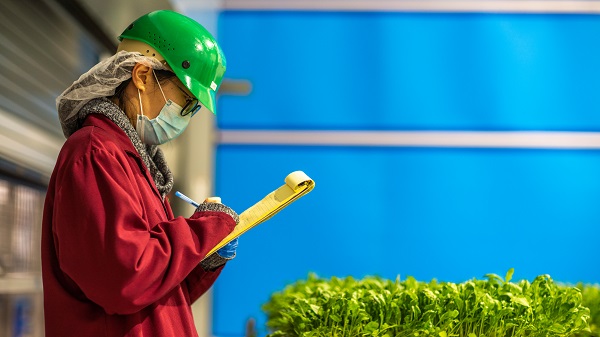 What started in 2011 as a dream to deliver fresh, nutritious produce to Canadians year-round has become reality. As Canada’s first and largest commercial vertical farming operation, GoodLeaf Farms began supplying microgreens and baby greens to retail locations and restaurants throughout Ontario in 2019.
What started in 2011 as a dream to deliver fresh, nutritious produce to Canadians year-round has become reality. As Canada’s first and largest commercial vertical farming operation, GoodLeaf Farms began supplying microgreens and baby greens to retail locations and restaurants throughout Ontario in 2019.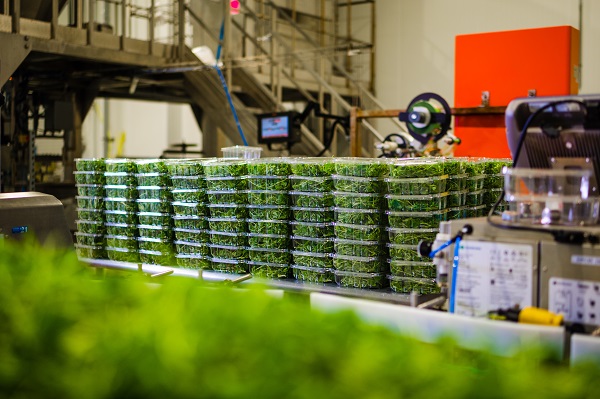 We are currently growing microgreens — Spicy Mustard Medley, Pea Shoots, Asian Blend, Micro Arugula, Micro Radish, and Micro Broccoli — and baby greens – Ontario Arugula, Ontario Spring Mix and Ontario Baby Spinach.
We are currently growing microgreens — Spicy Mustard Medley, Pea Shoots, Asian Blend, Micro Arugula, Micro Radish, and Micro Broccoli — and baby greens – Ontario Arugula, Ontario Spring Mix and Ontario Baby Spinach.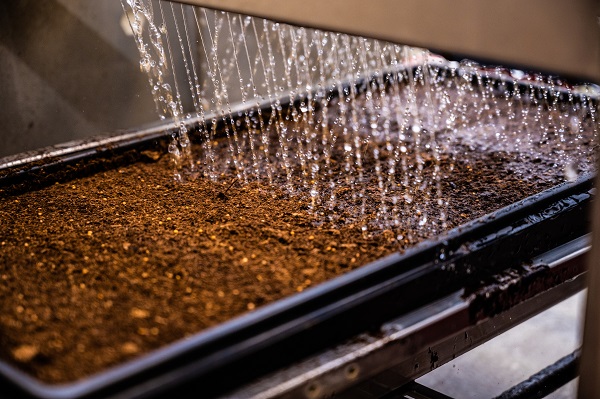 Our sustainable practices include:
Our sustainable practices include: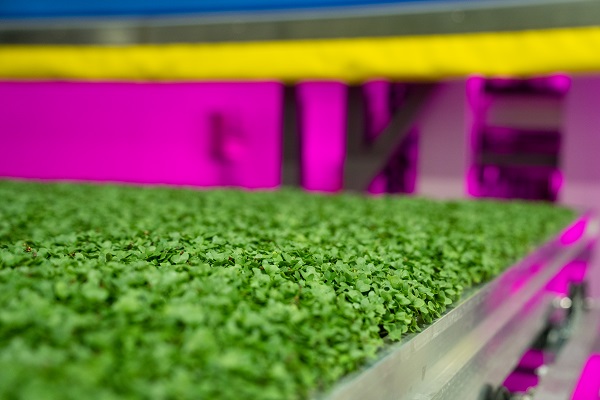 Construction on our Calgary farm is well under way. We are on schedule to have the 95,000-square-foot farm open and providing fresh leafy greens to grocery stores across Western Canada in first half of next year.
Construction on our Calgary farm is well under way. We are on schedule to have the 95,000-square-foot farm open and providing fresh leafy greens to grocery stores across Western Canada in first half of next year.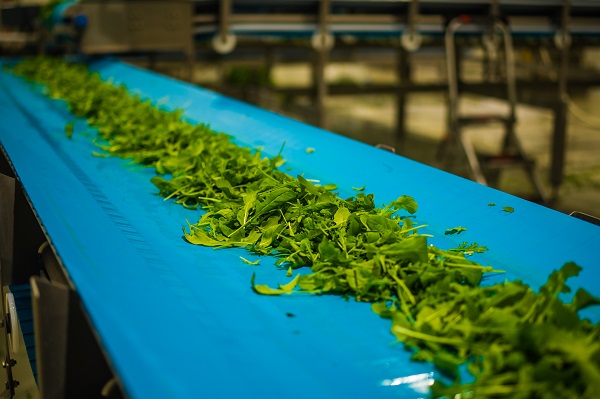 We are constantly innovating and experimenting with new processes and products to bring the best possible leafy greens to Canadian consumers.
We are constantly innovating and experimenting with new processes and products to bring the best possible leafy greens to Canadian consumers.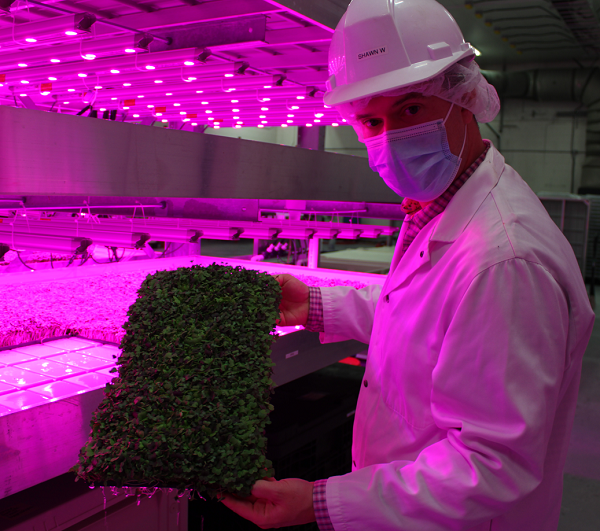
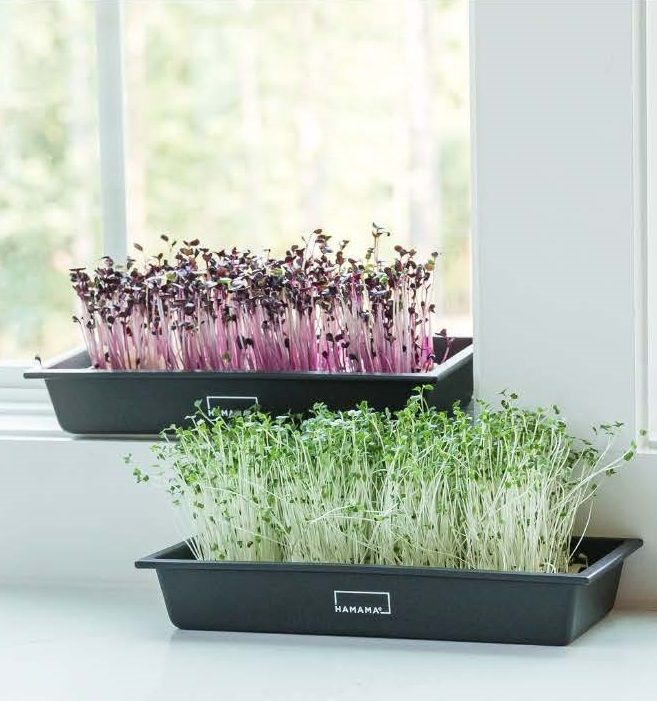

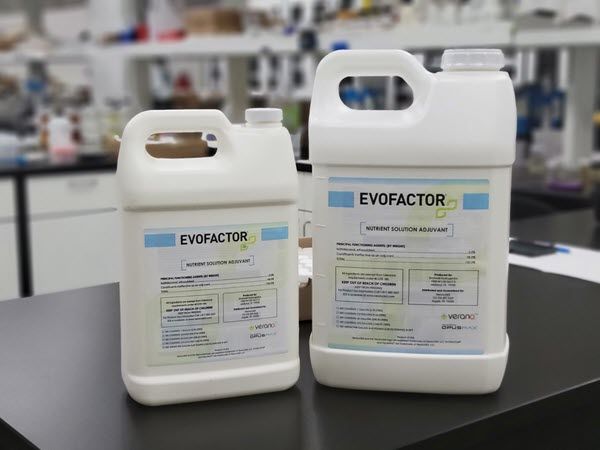
 Driever went on to detail how TAC has operated a 3,000 square foot greenhouse and 1,000 square foot grow room raising leafy greens for the past 10 years.
Driever went on to detail how TAC has operated a 3,000 square foot greenhouse and 1,000 square foot grow room raising leafy greens for the past 10 years. Launched in 2018, the indoor farm has approximately 6,000 square feet of space and capacity for 26,000 plants. The farm raises lettuce, kale, basil microgreens, amaranth, green and purple shiso, wasabi, cilantro and mint. Twelve full and part-time employees work at the indoor farm. They monitor the pumps, which dispense nutrients as they are needed. They transfer plants from germination to seedling stage and later to the area where plants grow to their desired size and are harvested. We have a great opportunity to explore agricultural sustainability and we’ve got a great opportunity to create jobs for people with disabilities. Arnold Farms uses no pesticides, and the founder Craig Varterian likes to call the facilities plants ‘purer than organic’. What’s Varterian’s dream for the future of Arnold Farms? He’d like to employ this kind of farming around the country, especially in ‘food deserts’ where food isn’t easily accessible. “I’d like to see people with disabilities as leaders around the country in this type of farming,” he adds. More information is available
Launched in 2018, the indoor farm has approximately 6,000 square feet of space and capacity for 26,000 plants. The farm raises lettuce, kale, basil microgreens, amaranth, green and purple shiso, wasabi, cilantro and mint. Twelve full and part-time employees work at the indoor farm. They monitor the pumps, which dispense nutrients as they are needed. They transfer plants from germination to seedling stage and later to the area where plants grow to their desired size and are harvested. We have a great opportunity to explore agricultural sustainability and we’ve got a great opportunity to create jobs for people with disabilities. Arnold Farms uses no pesticides, and the founder Craig Varterian likes to call the facilities plants ‘purer than organic’. What’s Varterian’s dream for the future of Arnold Farms? He’d like to employ this kind of farming around the country, especially in ‘food deserts’ where food isn’t easily accessible. “I’d like to see people with disabilities as leaders around the country in this type of farming,” he adds. More information is available  Founded in 1961, DDI is a dynamic, non-profit agency with more than 30 locations throughout Long Island, NY. It provides special education, vocational , day and residential programs, as well as healthcare services for more than 5,000 children and adults with autism and other developmental disabilities. The Horticulture curriculum of DDI offers greenhouse opportunities to more than 300 adults served in Adult Day Services. The greenhouse has been in operation for more than 30 years. Some of the vegetables include peppers, lettuce, tomatoes, squash, kale and various herbs to name a few. The greenhouse offers 1,500 square feet of growing space. This enables the DDI team to grow vegetables indoors during the colder weather. Vegetables grown are either sold at farmers markets or used at various site for cooking classes. More information is available
Founded in 1961, DDI is a dynamic, non-profit agency with more than 30 locations throughout Long Island, NY. It provides special education, vocational , day and residential programs, as well as healthcare services for more than 5,000 children and adults with autism and other developmental disabilities. The Horticulture curriculum of DDI offers greenhouse opportunities to more than 300 adults served in Adult Day Services. The greenhouse has been in operation for more than 30 years. Some of the vegetables include peppers, lettuce, tomatoes, squash, kale and various herbs to name a few. The greenhouse offers 1,500 square feet of growing space. This enables the DDI team to grow vegetables indoors during the colder weather. Vegetables grown are either sold at farmers markets or used at various site for cooking classes. More information is available  Greens Do Good raises microgreens, basil and butterhead lettuce hydroponically in Hoboken, New Jersey. They donate 100% of their proceeds to REED Next, a nonprofit organization supporting adults with autism. This helps provide continued education, life experience, and work opportunities so that these individuals can achieve greater independence and participate meaningfully in their communities. Greens Do Good also provides these individuals the opportunity to work at our farm. Our focus is on providing local businesses with top-quality, locally grown ingredients year-round. We hand-pick and pack our produce at the height of freshness and deliver them straight to our customer’s door for peak taste and nutrition. In the future, we hope to open more farms with the goal of expanding and continuing to create sustainable funding for REED Next. More information about our work is available
Greens Do Good raises microgreens, basil and butterhead lettuce hydroponically in Hoboken, New Jersey. They donate 100% of their proceeds to REED Next, a nonprofit organization supporting adults with autism. This helps provide continued education, life experience, and work opportunities so that these individuals can achieve greater independence and participate meaningfully in their communities. Greens Do Good also provides these individuals the opportunity to work at our farm. Our focus is on providing local businesses with top-quality, locally grown ingredients year-round. We hand-pick and pack our produce at the height of freshness and deliver them straight to our customer’s door for peak taste and nutrition. In the future, we hope to open more farms with the goal of expanding and continuing to create sustainable funding for REED Next. More information about our work is available  Lettuce Dream is a social enterprise engaged in hydroponic farming that exists to provide meaningful employment and job training programs for persons with cognitive or developmental disabilities so that they may enjoy the benefits of living, working and fully participating in our community. Lettuce Dream was founded in 2016 and operates a 6700 square foot hydroponic greenhouse. Lettuce Dream helps to provide workplace skill training for young adults with intellectual disabilities. The people with disabilities in Lettuce Dream’s program take part in an internship alongside volunteers from the community, staff and their college peers from Northwest Missouri State University growing 500-700 lbs of leafy greens and living basil per week. The interns in the program help with all aspects of Lettuce Dream’s business operations including- seeding, transplant, packaging, food safety recordkeeping, data entry, invoicing and customer service. After obtaining the necessary pre-vocational skills and developing their resumes through the internship program, Lettuce Dream helps the interns transition to community employment. Lettuce Dream helps the individuals in the program secure jobs and provides further on the job support through job coaching. Since their founding, Lettuce Dream has helped provide employment supports for 24 people with disabilities and has an 83% placement rate for individuals that have completed the program. More information is available
Lettuce Dream is a social enterprise engaged in hydroponic farming that exists to provide meaningful employment and job training programs for persons with cognitive or developmental disabilities so that they may enjoy the benefits of living, working and fully participating in our community. Lettuce Dream was founded in 2016 and operates a 6700 square foot hydroponic greenhouse. Lettuce Dream helps to provide workplace skill training for young adults with intellectual disabilities. The people with disabilities in Lettuce Dream’s program take part in an internship alongside volunteers from the community, staff and their college peers from Northwest Missouri State University growing 500-700 lbs of leafy greens and living basil per week. The interns in the program help with all aspects of Lettuce Dream’s business operations including- seeding, transplant, packaging, food safety recordkeeping, data entry, invoicing and customer service. After obtaining the necessary pre-vocational skills and developing their resumes through the internship program, Lettuce Dream helps the interns transition to community employment. Lettuce Dream helps the individuals in the program secure jobs and provides further on the job support through job coaching. Since their founding, Lettuce Dream has helped provide employment supports for 24 people with disabilities and has an 83% placement rate for individuals that have completed the program. More information is available Medina Creative Produce provides vocational training for students from Medina County School Districts and adults with physical and developmental disabilities, many whom are residents of Medina Creative Housing. Workers develop skills such as cultivating, harvesting and marketing locally grown, nutrient rich Butter Bibb and Romaine lettuce. Our hydroponic greenhouse is fully handicapped accessible to accommodate the broad spectrum of individuals with disabilities that we serve. In 2011, a Ribbon Cutting Ceremony was held celebrating the opening of our hydroponic greenhouse, which supplies local restaurants, schools and area businesses with gourmet lettuce. A weekly harvest produces on average six hundred heads of lettuce and proceeds pay the workers’ wages. Our lettuce is used to support our café’s located at local hospitals. More information available
Medina Creative Produce provides vocational training for students from Medina County School Districts and adults with physical and developmental disabilities, many whom are residents of Medina Creative Housing. Workers develop skills such as cultivating, harvesting and marketing locally grown, nutrient rich Butter Bibb and Romaine lettuce. Our hydroponic greenhouse is fully handicapped accessible to accommodate the broad spectrum of individuals with disabilities that we serve. In 2011, a Ribbon Cutting Ceremony was held celebrating the opening of our hydroponic greenhouse, which supplies local restaurants, schools and area businesses with gourmet lettuce. A weekly harvest produces on average six hundred heads of lettuce and proceeds pay the workers’ wages. Our lettuce is used to support our café’s located at local hospitals. More information available  Murdoch Developmental Center in Butner, NC is one of three state operated developmental centers, primarily serving 25 counties of the Central Region. Murdoch provides services and support to people with intellectual and developmental disabilities (IDD), complex behavioral challenges and or medical conditions whose clinical treatment needs cannot be supported in the community. Murdoch operates four specialty programs including children and adolescents programs which are available for individuals residing in all regions of the state. Our hydroponic greenhouse is a vital component of our vocational rehabilitation program. More information is available
Murdoch Developmental Center in Butner, NC is one of three state operated developmental centers, primarily serving 25 counties of the Central Region. Murdoch provides services and support to people with intellectual and developmental disabilities (IDD), complex behavioral challenges and or medical conditions whose clinical treatment needs cannot be supported in the community. Murdoch operates four specialty programs including children and adolescents programs which are available for individuals residing in all regions of the state. Our hydroponic greenhouse is a vital component of our vocational rehabilitation program. More information is available  Peacehaven Community Farm is a sustainable farm established in 2007 and located on 89 beautiful acres of organic gardens, rolling pastures, and lush woodlands that connects people with special needs to their community – and connects their community to them! After high school graduation, there are few housing and programming options for people with intellectual and developmental disabilities. Peacehaven seeks to offer these folks in our community the choice to live in a farm setting within a community where people with and without disabilities live and work side by side. We use the term “Core Members” to describe the individuals with disabilities who live and work at Peacehaven. That term reflects their central status in our community. They are at the core of all that we do and are the best teachers of the values of community. Major expansions in our vocational and housing programs are planned for this year. In our hydroponic greenhouse we focus on raising lettuce, greens and culinary herbs. Partnerships with other organizations in our community and the Growing Opportunities collation represent a keystone practice for Peacehaven. More information is available in this
Peacehaven Community Farm is a sustainable farm established in 2007 and located on 89 beautiful acres of organic gardens, rolling pastures, and lush woodlands that connects people with special needs to their community – and connects their community to them! After high school graduation, there are few housing and programming options for people with intellectual and developmental disabilities. Peacehaven seeks to offer these folks in our community the choice to live in a farm setting within a community where people with and without disabilities live and work side by side. We use the term “Core Members” to describe the individuals with disabilities who live and work at Peacehaven. That term reflects their central status in our community. They are at the core of all that we do and are the best teachers of the values of community. Major expansions in our vocational and housing programs are planned for this year. In our hydroponic greenhouse we focus on raising lettuce, greens and culinary herbs. Partnerships with other organizations in our community and the Growing Opportunities collation represent a keystone practice for Peacehaven. More information is available in this  Currently more than 85% of individuals with developmental disabilities are unemployed due to lack of transitional support, job-site training, and employment opportunities geared for success. The Trellis Center aims to fill this gap for young adults with developmental disabilities who are approaching this transition time or adults who have graduated from high school but still need a structured environment designed to match programming to individual capabilities. With a focus on agriculture, the Trellis Center provides vocational skill development, stimulating activities, and a social community of peers. More information is available
Currently more than 85% of individuals with developmental disabilities are unemployed due to lack of transitional support, job-site training, and employment opportunities geared for success. The Trellis Center aims to fill this gap for young adults with developmental disabilities who are approaching this transition time or adults who have graduated from high school but still need a structured environment designed to match programming to individual capabilities. With a focus on agriculture, the Trellis Center provides vocational skill development, stimulating activities, and a social community of peers. More information is available Building on the success of the indoor hydroponic operation, TAC Industries Inc. built a 3,000 square foot hydroponic greenhouse in 2010. Twelve adults with developmental disabilities regularly work there to raise lettuce, kale, cilantro and orache. The produce is served at our sister restaurant “Fresh Abilities” and is also available at the local farmer’s market. Our customers have also included both public and private local schools, restaurants and the local culinary institute. We aim to donate 40# of produce each week to 2nd Harvest Food Bank (supporting over 60 pantries in 3 counties). More information is available
Building on the success of the indoor hydroponic operation, TAC Industries Inc. built a 3,000 square foot hydroponic greenhouse in 2010. Twelve adults with developmental disabilities regularly work there to raise lettuce, kale, cilantro and orache. The produce is served at our sister restaurant “Fresh Abilities” and is also available at the local farmer’s market. Our customers have also included both public and private local schools, restaurants and the local culinary institute. We aim to donate 40# of produce each week to 2nd Harvest Food Bank (supporting over 60 pantries in 3 counties). More information is available  Through the use of innovative urban farming models, we provide supported employment for adults with special needs and autism. We grow greens and micro greens for local restaurants, colleges, and individuals within the community. All of our produce is non GMO and grown without the use of pesticides, herbicides, or fungicides. More information is available
Through the use of innovative urban farming models, we provide supported employment for adults with special needs and autism. We grow greens and micro greens for local restaurants, colleges, and individuals within the community. All of our produce is non GMO and grown without the use of pesticides, herbicides, or fungicides. More information is available